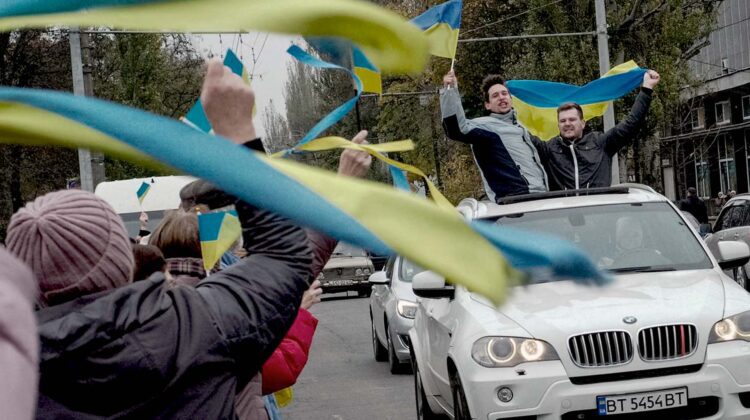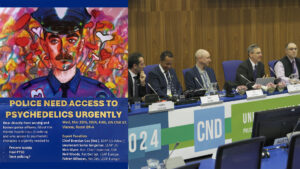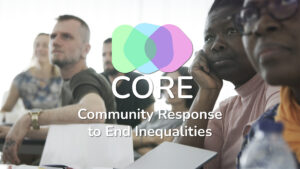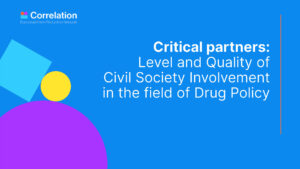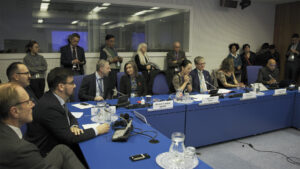We wanted to remember it, to make sure it would never be forgotten. On 29 August, the Ukrainian Armed Forces launched an operation to liberate the right bank of Kherson Oblast. And despite the regime of silence imposed by the General Staff, despite the disgusting communications, good news reached us from time to time.
For example, on September 4, we learned that the AFU had liberated Vysokopolye, one of the settlements in Kherson Oblast that was key to the implementation of de-occupation plans.
In the streets, on the benches outside the door, in the queues, everywhere, the word “offensive” was heard. The mood was upbeat. Again, despite Moscow’s hastily announced “referendum” on the occupied territories, despite the “treaty of accession to Russia” signed in late September in the Kremlin, it was clear to all that the day of Kherson’s liberation was near.
At the very end of October, several of the occupiers’ SUVs, including a huge Typhoon with the letter V on its side, drove up to the house opposite ours. Several military personnel got out of the vehicles and entered the house. Some of them remained at the entrance. We thought it was another act of terror by the occupiers – a search or an arrest. The men who entered the house were gone for 10-15 minutes. Then they came out, accompanied by civilians, and were literally laden with suitcases, bags, and boxes. They were talking peacefully and loading the “goods” they had brought into the cars.
Suddenly we realised it wasn’t a search, it was a REMOVAL! Someone clearly of value to the occupiers – a collaborator or a military superior – was moving out of the house, asking the military to help him with this. And all those boxes, suitcases, and bags were items obtained by looting, which he hastily wanted to take back to Russia. It was at this point we finally realised that the time of the occupation was over. All that was missing was a couple of touches from the AFU to complete the picture.
Throughout September and October fierce fighting took place on the outskirts of Kherson and further north, in the Beryslav area. The Ukrainian army was advancing. More and more often the lights went out and communication was lost in the city.
With the arrival of November events began to unfold very quickly: roadblocks were removed in the city, the Russian “tricolour” was removed from the building of the Kherson City Administration. Then the looting began. The occupiers took everything they could get their hands on. Fire engines and ambulances, trolleybuses and buses, cargo cranes from the port, wires, equipment, machines, furniture, and stationery were all taken from the city. The Local History Museum was looted; not only all the paintings but also all the furniture was taken from the Art Museum. The equipment of solar power stations (of which there are quite a few in the region), mobile phone towers, sanitary equipment and, of course, toilets were taken out.
Whilst some of what was stolen can somehow be explained, some things defy comprehension. For example, they took away the monuments to Ushakov and Suvorov. Monuments! They exhumed and took away remains of the prince Potemkin – favourite courtier of Catherine II, who was buried in Kherson. They also stole animals from the zoo, including a raccoon. A state of madness and fear of the approaching AFU forces was overwhelming them more and more.
On 9 November, the occupier’s defence ministry announced a “withdrawal” from Kherson. On leaving, the Russians disabled everything they could. They confiscated and disabled even Kherson’s boats. With their departure, there was no light, no communications and no water in the city. On November 11, our neighbours, having visited the centre, reported that the AFU had entered the city. The occupation of Kherson, which had lasted nine months, was over.
Igor Kuzmenko, a filmmaker and co-founder of the Drug Users News (DUNews) documentary studio, needs your help! Please make a donation today to support his work to produce a series of documentaries about the community of people who use drugs in Ukraine during the war. Movies about the people, organizations, and networks that save thousands of Ukrainians from death and give hope every day.
Or send any amount via bank transfer to one of the following accounts:
Igor Kuzmenko
JSC UNIVERSAL BANK, Kyiv, Ukraine
Euro account:
IBAN: UA103220010000026208334747018
SWIFT: UNJSUAUKXXX
USD account
IBAN: UA753220010000026206334939334
SWIFT: UNJSUAUKXXX
Suddenly the weight that had been pressing down on us all this time disappeared, and the scorching sight of the grey November day in the window began to transform, and after a minute I felt its beauty. It was like in the movies, when a black-and-white picture suddenly becomes colour – beauty is in the eye of the beholder.
Throughout these months of occupation, I thought that I had used up all my feelings, and that I could no longer feel anything. Moreover, I believed that I would never again be able to feel anything like joy and love. It was as if time had taken everything I had inside me and carried me away in shackles and handcuffs, somewhere to the east, to a place where people were no longer human and had turned into beasts. But it turned out they weren’t. I looked out the window and felt that we were going back to that free Kherson we had been separated from.
The next day we drove downtown to meet the city. For the first time in nine months I left my neighbourhood and for the first time in six months I was out of the house. We wanted to catch up on the news, talk to people, and charge our smartphones. The streets were full of people, especially the central square of the city. There were Ukrainian flags everywhere, music playing, people cheering, laughing, hugging, crying. Journalists from all over the world crowded around the Starlink terminals.

The Ukrainian soldiers were never given a pass – as soon as one of them appeared, he was immediately surrounded, hugged, and asked to take a photo. The Ukrainian soldiers looked very cool and courageous, and their faces lit up with happiness. Many of them were from Kherson and had been lucky enough to liberate their hometown. It was absolute happiness, pure and unconfused happiness.
For the first time in months, police officers appeared on the streets. We took the opportunity to ask one of them how things were going out of Kherson. He explained to us that there would be a few days of “mopping up” as there was a possibility that some of the occupiers had “wandered off” into the city and its environs. In addition, it was necessary to apprehend the collaborators and traitors who had not managed to escape from the city.
Life in liberated Kherson went on as usual. Every morning we went to the Dnieper River for water and to a nearby church to get potable water. Then we drove to the city centre to charge our phones. We returned home, had lunch, minded our own business, went to bed. And on 13 November, Ukrainian mobile phone service arrived back in the city. At first it was unstable, but after 24 hours it was already possible to communicate with the outside world.
On November 14, I called the director of the All-Ukrainian Association of People with Drug Addiction (VOLNA), Oleg Dymaretsky, explained the situation, and asked if there were any options to help us leave Kherson. Oleg assured me that there were and asked me to let him know as soon as the city was opened for departure.
On 16 November, on another trip downtown, we learned from a policeman that the city had been open since the previous night. I immediately contacted Oleg. Oleg was brief. “Wait,” he said. – “We’ll pick you up tomorrow.” He asked busily how many of us there were, how much luggage we had. Then he said that there was enough room in the car and that Igor Kozak, the advocacy coordinator of VOLNA, would come to pick us up tomorrow.
Igor arrived in Kherson earlier than we expected. Having left Kiev at 5am, at 1pm he was already parked in front of our driveway. Half an hour later, we set off.

Getting from Kherson to Kiev was not easy for us. It was not the numerous checkpoints with document checks or the long drive. The fact was that we had heard about the war (the sounds of “incoming attacks”, the rumble of counter-battery fire, the booming bursts of air defence missiles), read about it in articles, and watched it in chronicles, but we had never seen the gruesome results of the war with our own eyes. The vicinity of Kherson towards Mykolaiv was one solid wound: bridges blown up, villages razed to the ground, land blackened by fires, mines defused by sappers and lying on the roadside. It was painful to look at. Very painful. But we kept watching. We wanted to remember it, to make sure it would never be forgotten.

We arrived in Kiev on time, before curfew. Oleg, Igor, once again – thank you so much for that! Everything here seemed amazing to us – the working traffic lights, the signs of cafes and shops, the people rushing about their business, the lines of cars. We had grown unused to all this, seeing only blackness in our windows for a long time. Our minimum hope, or expectation – survival – had been completed. Now we dared to hope for the maximum: Victory.
Epilogue
Simple conversations about trivial topics – How’s it going? How’s work? How are the kids? What’s new? – have a lot of power and a lot of meaning. It is thanks to such conversations that we have stayed afloat all this time and have not fallen into an abyss of despondency and depression. My friends, colleagues, acquaintances, strangers, and total strangers, all those who talked to us during the whole nine months of the occupation, thank you for that. Your help was and is invaluable!
Kiev and Vilnius, Berlin and a small kibbutz in Israel, Lviv and New York, London, Ivano-Frankivsk, Bath, Hamburg, Budapest, Tbilisi, Geneva, Prague, Porto, Tel Aviv, Limassol, Copenhagen… Your optimism inspired, your warmth warmed, your help saved. Thank you. I am very grateful to you.
Igor Kuzmenko
Many thanks to the Eurasian Harm Reduction Association (EHRA) and personally to Ganna Dovbach for translating and helping to produce this series.
My deepest thanks to Alexander Levin for his help in producing these articles.
Read the series by Igor Kuzmenko on how they survived the occupation in Kherson:
